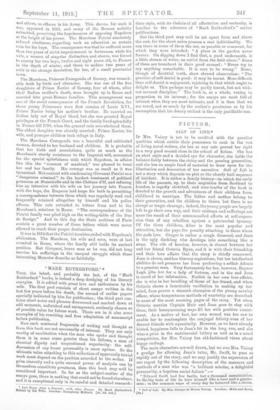" MARIC RUTHERFORD."* Tun, the latest, and probably the last,
of the " Mark Rutherford" books, is indeed a deep dredging of his literary energies. It is edited with great love and enthusiasm by his wife. The first part consists of short essays written in the last few years before his death, the second of earlier papers specially indicated by him for publication; the third part con- tains short notes and phrases discovered and marked down at odd moments, unfinished and unimproved, evidently chosen as of possible value for future work. There are in it also some examples of his rewriting and free adaptation of manuscript
be fore publication.
Now such scattered fragments of writing and thought as form this book are not necessarily of interest. They are only worthy of recollection when the man who spoke and thought them is in some sense greater than his follows, a man of classical dignity and unquestioned superiority: the self- discussion of any lesser personality is mere egoism. So the ultimate value attaching to this collection of apparently trivial work must depend on the position accorded to the writer. If grim sincerity and a quite unusual power of analysis can by themselves constitute greatness, then, this book may well be considered important. So far as the subject-matter of the essays goes, there is nothing that could not be found elsewhere, and it is exceptional only in its careful and detailed research : " Last Pages from a Journal with other Papers. By Mark Rutherford. Edited by his info. London; Humphrey Milford. [4e. 6d. net.]
their style, with its disdain of all affectation and verbosity, is familiar to the admirers of "Mark Rutherford's" earlier publications.
But the third part may well be set apart from and above the rest, for the short notes possess a real individuality. We can trace in some of them the use, as parable or comment, for which they wero intended: "A place in the garden never freezes. On digging down I find that, a yard underneath, is a little stream of water, an outlet from the field above." Some of them are trenchant in their good counsel : "Never try to say anything remarkable. It is sure to be wrong." Some, though of doubtful truth, show shrewd observation : " The practice of self-denial is good: it may be learnt. More difficult than self-denial is enjoyment, rejoicing in that which ought to delight us. This perhaps may be partly learnt, but not with- out severest discipline." The book is, as a whole, vexing in proportion to its interest ; for the essays are most full of interest when they are most intimate, and it is then that we are vexed, not so much by the author's pessimism as by his assumption that his dreary outlook is the only justifiable one.


































 Previous page
Previous page